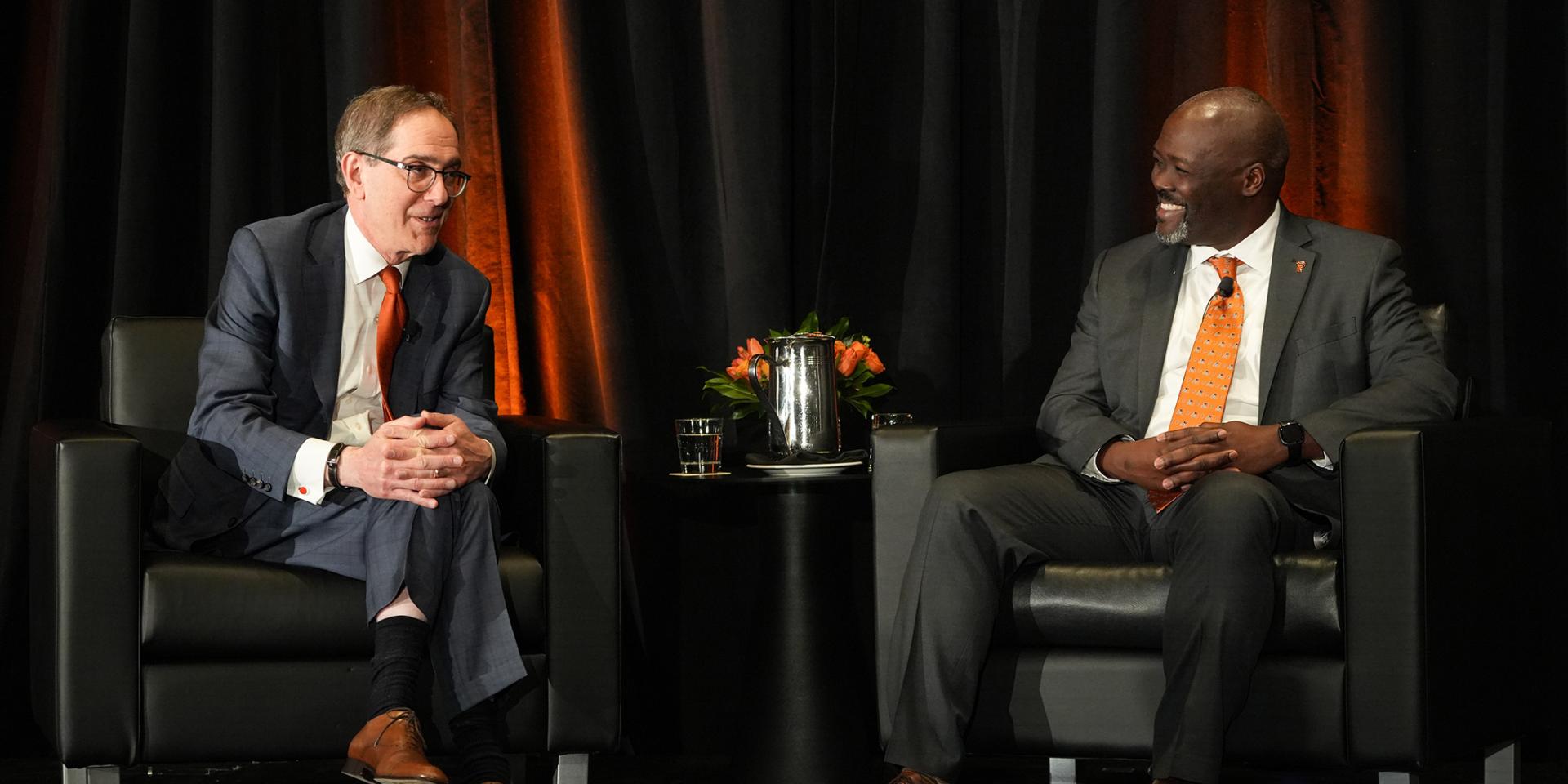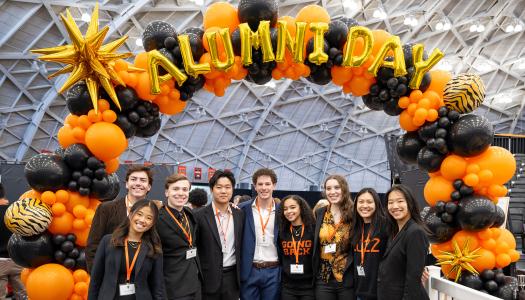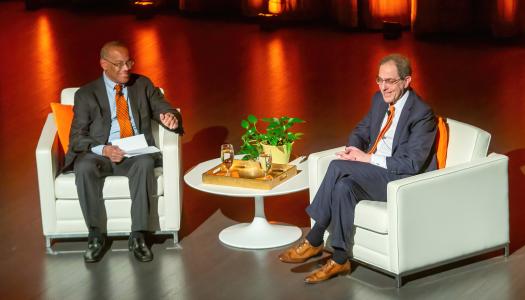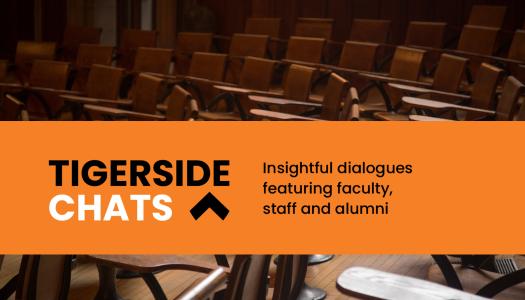Photo by Alabastro Photography
Seattle alumni welcome President Eisgruber ‘home’ in final Venture Forward gathering of season
President Christopher L. Eisgruber ’83 and John Mack ’00, the University’s Ford Family Director of Athletics, appeared together at the Bell Harbor International Conference Center in Seattle on April 2, the last of a series of presidential gatherings with alumni and friends during the final year of the Venture Forward campaign.
Alumni Council President Monica Moore Thompson ’89 began the evening by introducing herself and welcoming nearly 320 guests to the event. “I am Princeton, you are Princeton and together we are Princeton — and that ‘we’ is a powerful and positive force,” Thompson said. “Our shared traditions create an orange and black tapestry that weaves together our special community, and there’s something else we all have in common as Tigers: Princeton made an audacious bet on who we are and what we would become and accomplish.”
Following a Venture Forward video, President Eisgruber began the conversation by expressing his gratitude to the Princeton alumni community and acknowledging that the gathering represented a homecoming for him. “One of the things that makes my job wonderful is that Princeton has the best alumni community in the world, and I feel the strength and the support every time we do an event like this,” he said. “And it’s just wonderful for me — as somebody who grew up in Corvallis, Oregon — to come back to the Pacific Northwest and to see all of you.”
He noted that the conversation with Mack would include intercollegiate athletics and the Ivy League and that, separately, he would also address notifications from government agencies suspending several dozen Princeton research grants.
“As we react to the issues right now that are confronting higher education and confronting our University in particular, we do so with three principles in mind: One that is really clear is we’re going to comply with the law,” Eisgruber said. “The second is we’re going to stand firm for the values of our University. And those values include free speech, academic freedom, and diversity and inclusion. And the third thing is that we are going to work to make sure that our community can persist in its mission as we do those things.
“I don’t want [our students and faculty] thinking all the time about the set of challenges that we may face in government affairs,” he added. “I want them doing the things that make a Princeton experience fabulous. And that’s the research that you just saw [in the Venture Forward video]. That’s the education you all know about as a graduate and undergraduate alumni of our University, and it is what goes on in intercollegiate athletics as well.”
When the conversation pivoted to athletics, Mack shared his personal story: growing up in a small town outside Detroit, becoming a champion sprinter at Princeton, being offered his first job as an intern in the Department of Athletics and being named director of athletics in 2021. “This role is about offering current and future student-athletes the same opportunity for a positive and life-changing experience at Princeton and across the Ivy League through the power of sports,” Mack said. “Whatever role that sports and athletics play in your life, I think there are lessons to be learned, and my role and our department’s goal is for all student-athletes to have a positive experience through the platform of sports.”
Mack described how the Ivy League’s approach to athletics is governed by two fundamental principles: personal integration and restraint. The first principle is intended to ensure that every student-athlete receives “the full benefit of being a Princeton student,” said Mack, who explained that Princeton athletes don’t live in separate dorms or eat in separate dining halls, like many other non-Ivy schools.
The idea of restraint, he said, refers to the Ivy League’s schedule, which typically includes more condensed seasons than non-Ivy schools, as well as a practice schedule at Princeton that works around course times and study hours. “I tell prospective student-athletes and their parents that Princeton is designed over the course of four years to make you the best version of yourself,” Mack added. “Part of that is challenging yourself to discover, ‘Well, who else am I beyond being an athlete, beyond being an artist, beyond being just a student?’ The University is full of other ways to develop part of your identity, and that can only happen at a place like Princeton that has set aside time for students to explore and challenge themselves in a safe environment.”
After President Eisgruber congratulated Mack and the Princeton sports teams for another outstanding year of Ivy League success — 11 conference titles so far — he asked about the shifting landscape of intercollegiate athletics. Mack acknowledged that “college athletics has never had a more unstable period than the last four or five years,” in large part because of a proliferation of money.
Mack and Eisgruber agreed that these new financial realities have upended the status quo of college sports. “If anyone tells you they know where [college sports are] headed, they’re lying to you, frankly,” Mack added, referring to lawsuits that are challenging various parts of the NCAA structure. “Fundamentally, one of the things that I feel confident about is that we here at Princeton and in the Ivy League continue to be in great shape. We’ve spent the last several years intentionally talking to industry leaders about how we can continue to position ourself as a league for success and maintain our values, not having to play the same game that everyone else in the country has been playing.
“The overwhelming response that we have been given is that the best thing we can do is continue to double down on Ivy League values, to continue to double down on our model because it has proven time and time again that it works. … When you see the breadth of success that we have athletically, but then you see who [our student-athletes] turn around to be as people, as leaders, it reinforces all the things that at its core, college athletics should be about.”
President Eisgruber said that Princeton and its Ivy League peers might face some tough decisions in the future. “We’re going to have to be very focused on the values that define Ivy League athletics,” he said. “What we’re trying to do first and foremost is produce great Princetonians for the future. And if we do that, [athletics] will remain a valuable part of what Princeton University is.”
During the audience Q&A, the first questioner asked about President Eisgruber’s decision to publish a March 19 article in The Atlantic that called for university leaders across the country to “demand a stop to the government’s unwarranted intrusion on academic freedom at Columbia” and other institutions. “A lot of people were saying the prudent thing to do is just to remain quiet and not to attract any attention,” he told the audience. “I took that argument very seriously, both because there was risk to me and because there was risk to our community and our institution, but I thought that those risks were there whether I spoke or not.
“I also decided that if those risks are going to come, … if we were at some point to be the target of these actions, I would want my voice to be out there,” he added. “I lost a couple of nights’ sleep in making the decision about whether to put that out there, but I’ve been very glad that I spoke up … It’s an important time. And the last thing I should say on this, I hope we can work together with the [Trump] administration to preserve and strengthen the compact that has made our nation strong and our University strong.”
Another audience member asked about discussions in Washington, D.C., to raise a tax on the endowments of institutions like Princeton. (In 2017, Congress began taxing university endowments at 1.4%; there are new conversations in Congress to raise that tax significantly.) President Eisgruber welcomed the opportunity to explain the importance of the endowment — from which the University spends about 5% each year — in maintaining its mission of excellence in perpetuity. “The fact that we can take this large endowment and spend from it in this way is what has made it possible for Princeton to go from a place where people graduated with significant amounts of debt to a place where 83% of our students graduate debt-free,” he said. “Those kinds of taxes on Princeton and our peers would force us to make choices between: Are we going to cut back on our commitments to affordability and access? Are we going to cut back on seizing new research opportunities?
“We need people to understand what endowments are and that they are being put to use to make education better and more affordable than it’s ever been,” he added, urging alumni and friends to write to members of Congress and speak up about the endowment tax. “We are finding that as people in Congress hear from folks that they care about the endowment tax, it makes a difference to how they think about this. It will help to hold that rate down.”
The final audience question related to artificial intelligence (AI) and how the University was balancing the risks and benefits of the technology. President Eisgruber acknowledged the uncertainty and legitimate concerns of AI while emphasizing its promise for humanity. “All of a sudden, we can ask and answer questions that we weren’t able to before — to address questions about genetic code, questions about astrophysical data,” he said. “When as a university, you have a tool that suddenly makes it possible for human intelligence to grasp and do things that it couldn’t do before, I think overall that’s an opportunity for us.”
He pointed to several AI projects and initiatives underway at the University, including the New Jersey AI Hub, a collaboration with Microsoft, CoreWeave and the State of New Jersey to create a regional ecosystem anchored at Princeton. “We look forward to working with institutions around the state to create an environment in which entrepreneurship can thrive,” Eisgruber said.
The Princeton Laboratory for Artificial Intelligence — or AI Lab — is another important initiative in this field, Eisgruber said, calling it “our umbrella for research ventures.” The AI Lab and the University benefit from the leadership of Jen Rexford ’91, the Gordon Y.S. Wu Professor in Engineering and Princeton’s provost. “Usually when someone asks me, ‘What’s the future of AI?’ I say, ‘I’ll ask Jen about this,’ because she’s our provost and the expert,” Eisgruber said. “We needed to set her up to act as a kind of venture capitalist within the University, so she is doing things where she funds pop-ups in particular areas, knowing that we need to put a lot of investment behind what’s happening in this research area.
“AI is going to be pervasive in what we do as a University going forward,” he said. “For me, it’s something that does entail risks that we need to be addressing. We need to be thinking about those questions about how AI is going to affect the future, but also the great opportunities, and it’s precisely what our University ought to be doing.”
After President Eisgruber thanked the audience for attending, Jessica Marshall ’96 stepped forward to lead the audience in the singing of “Old Nassau.” The conversation was followed by an all-alumni reception with refreshments. An after-event gathering was held for recent alumni (those who graduated within the last 10 years) at a nearby restaurant.



